In this post, we’re diving into deschooling: what it is, how to deschool (and do it successfully), the benefits of deschooling, and the difference between deschooling and unschooling.
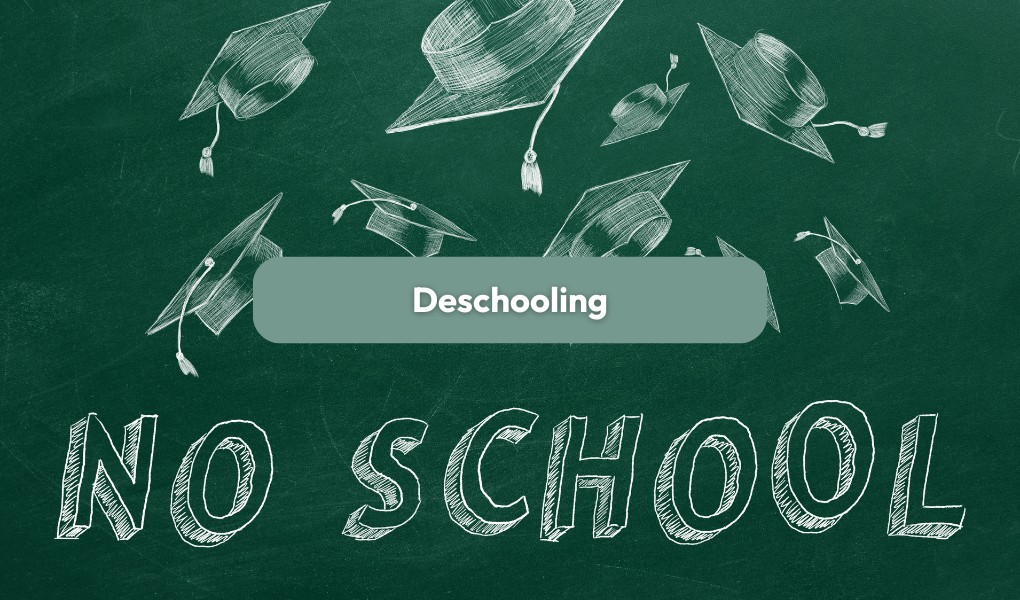
In this post, we’re diving into deschooling: what it is, how to deschool (and do it successfully), the benefits of deschooling, and the difference between deschooling and unschooling.
Whether you’re planning to deschool your child or just want to learn more about it, everything you need to know is right here!
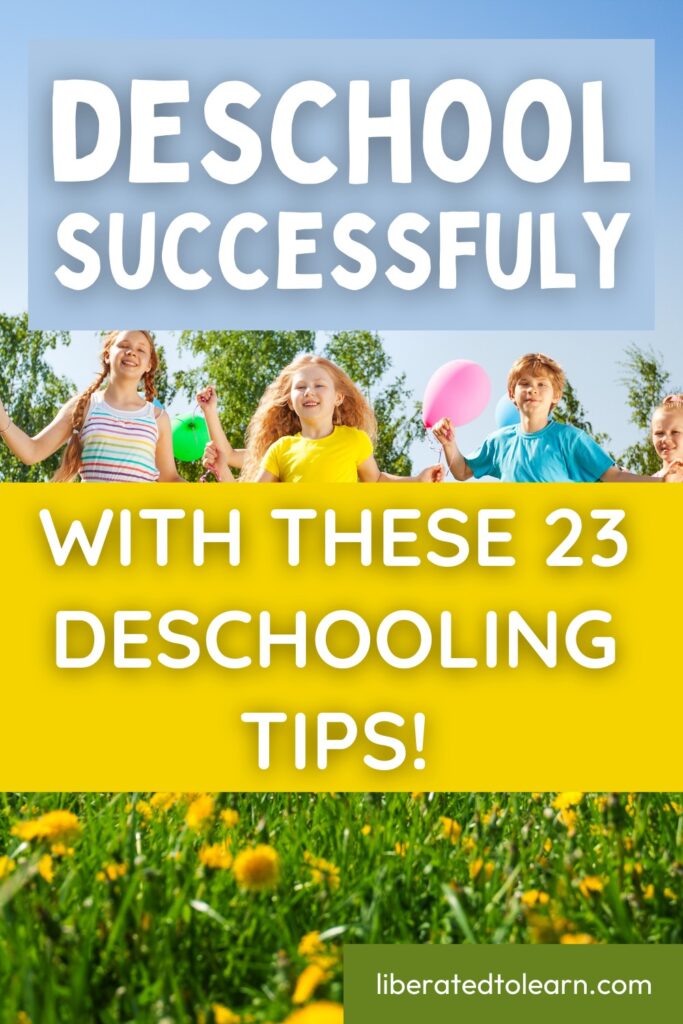
Contents
What is Deschooling?
Deschooling is the first step that most home educators will take once their child has been deregistered from school. It’s the transition period from school to home education and it’s a highly recommended path to take. So, why might that be? And how can you do it successfully?
Firstly, going from a structured school routine to the freedom of being educated at home and having a lot more time can be challenging for children. They’re going to be used to structured timetables, being told what to do, and what to learn. But these habits and routines are going to be completely different in a home environment, and that will take some getting used to.
Children need time to unlearn everything that ‘school’ has taught them and deschooling gives them this chance. It allows them to follow true passions and find out who they really are and what they care about. It’s a whole other opportunity for learning.
Generally, the longer that a child has been in school, the more time they’ll need to deschool. This gives them enough time to get the habits of school out of their system and embrace a different style of learning. Every child is different and some may adjust quicker than others. That’s completely okay!
We should mention that deschooling is often a term that is misunderstood by non-home educators. This is because others may misinterpret the word and form the assumption that no education is being provided. It is therefore advised to avoid using the term ‘deschooling’, especially if conversing with the Local Authority, and instead explain what works best for your child’s education, how you provide them with valuable learning experiences, and how it benefits them.
Why Should You Deschool?
Deschooling is important and actually essential if you want to make the most out of home education and start off on the right foot. Children need time to adjust and, more importantly, time to decompress from the stresses of the school system.
The time between deregistering school and starting home education should be used to follow your child’s interests and break free of any previous restrictions that they experienced at school. They deserve to fall in love with learning again, but also to do it in a way that works best for them.
This may look like reading books or doing lots of outdoor activities or observing and getting hands-on. Essentially, you want to put as much distance between the traditional schooling system and home education as possible until you discover what is the right learning style for your child.
Deschooling isn’t just beneficial for children, it’s extremely helpful for adults too. As many of us have experienced the traditional way of schooling, it’s easy to fall into replicating it at home, sometimes without us even meaning to. If we allow ourselves to forget about everything that we think we know about education, it makes it easier to start afresh and form our own ideas and routines.
As we like to say, Deschooling is about disconnecting before reconnecting.
How to Deschool
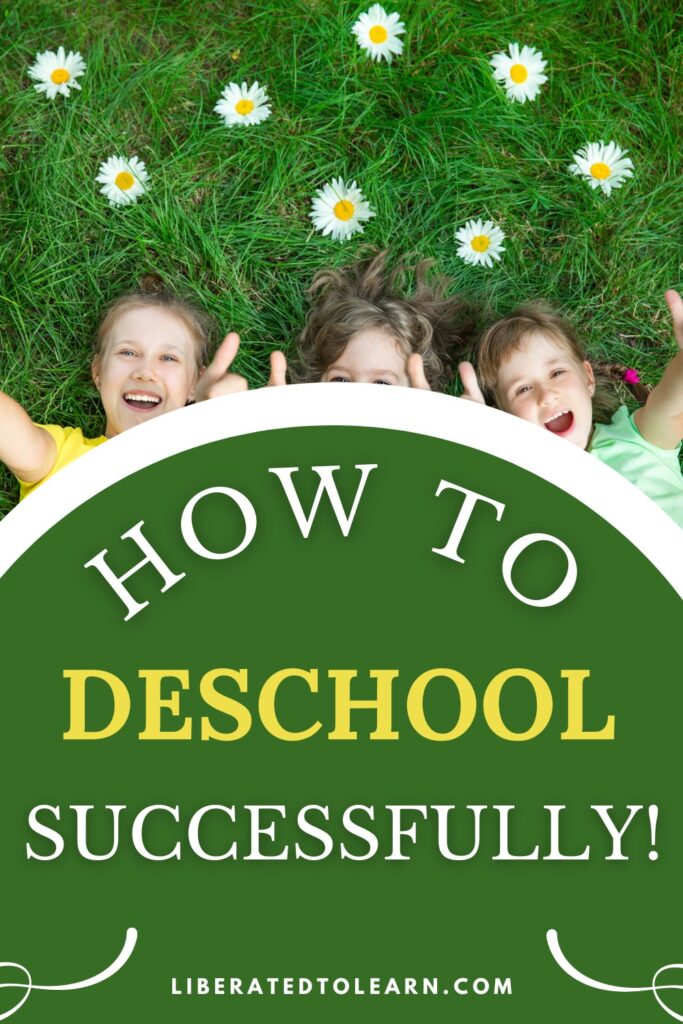
When you first take your child out of school, you may face some challenges. This is completely normal. Some parents may find that their child doesn’t want to do anything. They might want to watch TV or play video games all day. They might refuse to go out. Remember, they are trying to get used to this new sense of freedom now that they are not restricted by a school classroom.
If you let your child take control and see where their interests lead, this can definitely help. Let them decide what to do for the day, what they eat etc. You can offer them resources and try out different things. Don’t put pressure on yourself or your child and remind yourself that this is a transition period. It doesn’t matter how long it takes, only that it helps you and your child break away from expectations and discover new ways to learn.
Here are 23 tips on how to deschool successfully.
1. Go into deschooling with an open mind
Deschooling is going to look slightly different for everyone because no two people are the same. You shouldn’t have too many expectations of how you think deschooling might go. Instead, have an open mind and relieve any pressure by taking each day as it comes.
Every day will be different and some days may be harder than others, but that doesn’t mean you are failing. Deschooling takes time and it’s meant to. Everything will fall into place when it’s right.
2. Tell your child about deschooling
Your child might not understand what is happening or what deschooling even is, especially if they’re quite young. Being taken out of school can be both exciting and daunting for them as their previous routine is going to completely change. But by simply explaining what deschooling is, and having a conversation about how they want to go about it, can really help children to adjust. It also makes them feel involved in the process and they’re more likely to embrace it.
Remind your child that deschooling is a transition period and that it’s an opportunity to try out different things. Give them a head’s up that routines are bound to change over time, and allow them to have control in what they want to do and how they want to learn.
3. Challenge and question school norms
In order to break away from the traditional schooling system, it can be a good idea to discuss its limitations and to challenge them. Ask your child about what they liked and disliked about school. Then discuss what you are going to do differently.
For home educators, it’s worth thinking about why you are making different choices with your children and to challenge school norms. A school’s expectation is that children need to sit up straight at a desk and work in silence in order to concentrate, when really you might find that your child works better whilst listening to music.
Don’t feel like things have to be done a certain way because that’s how it’s done in school. What matters most is that your child is engaged, that your child is learning, and that the way they are doing something is effective for them.
4. Don’t rush to educate
Don’t rush into finding a learning style or having curriculums or routines set out for your children. You may find the urge to get them learning or feel like you are not doing enough, but remember, this is a chance for both you and your children to take it easy and find your feet. If you go in full steam ahead, it’s likely not going to work out.
Take the time to do some fun activities and you’ll find that the learning happens naturally.
5. Take a break
Instead of rushing to figure everything out, think of deschooling as a mini break where real interests can be explored. It’s time for a more laid back approach while your child rediscovers the joy of learning without any restrictions.
6. Step away from formal learning (for the time being)
Throughout the period of deschooling you may find that your child learns better with structure, following a curriculum, and having more formal learning experiences. However, when you first start deschooling, you want to step away from a formal, school-like education as it doesn’t give your child the opportunity to try out different learning styles or the freedom to discover new interests.
If, over time, they have a preference for sitting at a table with worksheets or following a curriculum then support them in their learning, but try and refrain from becoming the ‘teacher’. Your child deserves control over what they are learning and how they achieve it.
7. Create new experiences
Try things that you and your children haven’t done before. Get them outdoors, learn a new skill, or simply just spend time together. There are tons of learning opportunities in the simple tasks that we do every day and your child will learn from every experience.
Some recommended activities are:
- Trying a new hobby
- Following a recipe and cooking together
- Getting your children to help with the shopping by following a list
- Going on walks
- Reading together
- Playing board games
- Asking your child to plan out the day
- Visiting a new place
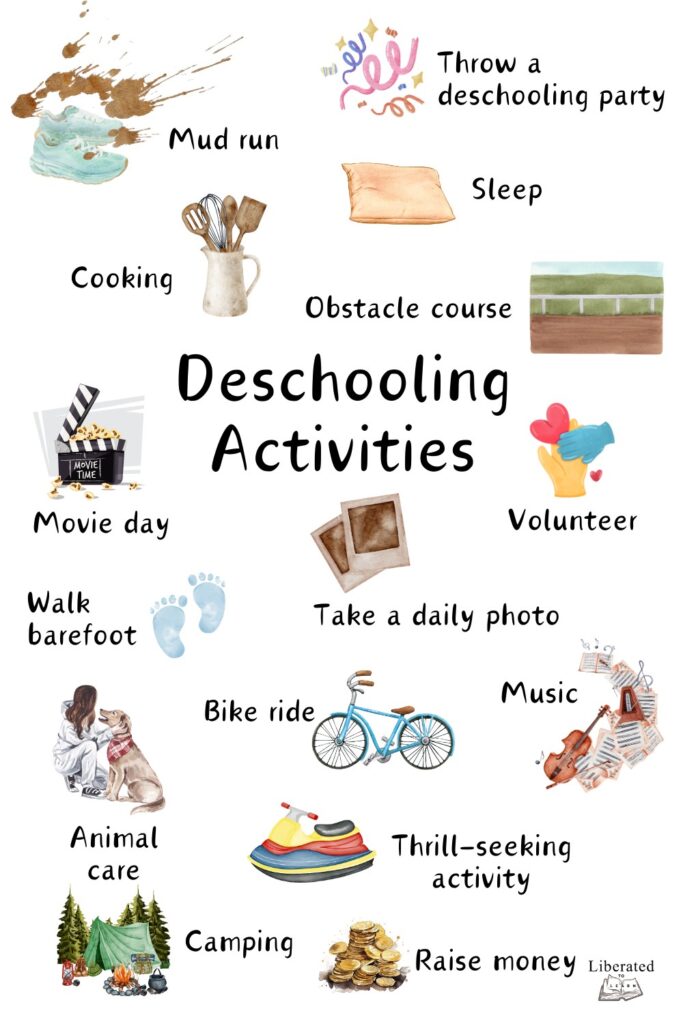
Deschooling activities can be as adventurous or as simple as you’d like them to be.
8. Get outside
Fresh air creates fresh minds and there’s nothing better than being outdoors. Take books out and do activities inspired by wildlife and nature, or simply have a picnic and play sports. The world is a far better and bigger classroom than those with four walls.
9. Find your natural family rhythm
Routines are going to change and it can be hard to work out a schedule right away. Too much routine can cause stress and burnout, but too little may result in a lack of stimulation for children and leave parents feeling lost.
What can help is finding a natural rhythm over time and ensuring that there is balance throughout the day or over the course of a week. If one day is filled with lots of outdoor activities then spend the next day doing something more chilled at home.
Mornings and bedtimes may naturally form into some sort of routine, but don’t stress if they don’t. See what is working for your family and adjust what is not. It’s also worth pointing out that if you have more than one child at home then the nature of their relationship and routine is going to change as they adjust to spending more time together. This is something that takes time to work out, but it eventually falls into place.
10. Try out a range of learning resources and opportunities
Switch things up from a traditional textbook or classroom-style learning and try different things. Use online resources, watch documentaries, take learning outside, join groups and clubs, try educational games—there are so many resources out there. Let your child make new discoveries and try out as many things of interest to them.
11. Follow your child’s interests
Deschooling gives your child more opportunity than ever to explore their own interests. Let them delve into different hobbies and activities, even if they constantly change their mind. It’s good to let them try out as many things as they’d like because every interest will shape them as a person.
By following their interests, you also encourage your child to want to learn. So, use their interests to guide their education.
12. Don’t force a routine
If you’re a super structured and organised person, it can be hard to not want to get into a routine. But, during the early stages of deschooling, it’s more beneficial to let your child get to grips with what their day looks like now that they’re not in school. This means going with the flow and allowing them time to relax and adjust to their new situation.
We’re not saying don’t plan anything or develop a schedule, it’s more about letting the routine naturally fall into place. See how the day pans out with your chosen activities. Some children thrive on routine and others not so much. You’ll soon find out what works for your child.
13. Be flexible
Flexibility is key to deschooling because one day might look completely different to the next. If you worry about having too much structure then this might put pressure on your child. Be as flexible as possible with choices and routines and remember to enjoy it!
14. Do tasks together
Whether it’s the washing up or helping with laundry, if they’re happy to, get your child involved with daily tasks. This doesn’t mean forcing them to do chores. These tasks can be something fun, like colouring or building something together. What matters is that you are helping each other and your child has your attention.
15. Build a support network
During the deschooling period, it’s helpful to build a support network around you so that you don’t feel like it’s all on your shoulders. Reach out to friends and family for help, drop your children off at groups or clubs when you need a break, and seek advice online if you’re struggling.
16. Get advice from other home educators
There are many people who have been through deschooling and those who are going through it. Getting advice and support from other home educators will be invaluable to your mindset and your own deschooling journey. There are always people who are willing to help and along the way you can also help new home educators too.
17. Focus on learning instead of teaching
It’s so easy for us to think that we have to become the teacher now that we are home educating our children; however, home education is about us becoming the facilitator to our child’s education and not the director of it.
Children need our guidance but they also need the chance to learn for themselves. By letting them delve into their interests, make their own decisions and lead their own way, we will encourage them to learn.
Sure, you can give your child worksheets and books but don’t feel the need to actively teach them unless they’ve asked you about something. It’s much easier to give the answers but it’s so much better to let children find out the answers.
18. Get creative
When deschooling you can be as creative as possible. Where school might have limited your child’s creativity, now they are free to do whatever they please (within reason), however they please. Think of fun, unique ways to do things, create things and learn things. Be as wacky as you want because now is the chance to make your child’s education really enjoyable!
19. Read books/listen to podcasts
Many of us might choose to go with the flow, but you don’t have to go into deschooling or home education feeling unprepared. Reading books and listening to podcasts will help you gain more information about home education and what your options are. It’s also a bit less daunting when you have an idea of what you’re doing.
Related: Popular Home Education Podcasts: For Parents & Kids
20. Focus on life skills
What school doesn’t teach, your child can learn — and life skills are exactly that! They help prepare your child for the ‘real world’ and enable them to handle life’s challenges and demands.
Related: The Ultimate List of Life Skills to Teach Children
21. Remember why you have chosen to home educate
Sometimes we just need a nudge in the right direction and remembering why we have chosen to home educate can really help to align our goals. Once we have goals in place, it’s easier to work out how to achieve them.
So, what made you want to home educate and why?
Remember, deschooling is just one part of the process but it’s not an obstacle. It’s something that will help you to reach your ideal home education destination.
22. Don’t worry about your child falling behind
All too often, parents worry that they’re not doing enough for their children, that they’re not where they’re supposed to be. And yes, it’s difficult not to compare your child to another when comparison is something that we see often in today’s society. Unfortunately, in a school environment everyone is expected to reach the same level despite every child being completely unique. But this isn’t the case with deschooling and home education.
Every child learns at their own pace and trying to help them catch up with their peers or live up to society’s expectations will only increase pressure on them. Remember, children can have skills in one field more than another, so sometimes it’s best to focus on what they’re good at and what they actually enjoy.
We like to say “a child is never behind — they’re exactly where they’re meant to be.”
23. Learn about Unschooling
Deschooling often leads to Unschooling because they are both very similar in that they reject traditional school methods and focus on a child-led approach. Because unschooling and deschooling complement each other, it’s worth learning more about it. Some home educators find that they naturally enter unschooling before going on to try out different styles of home education to see which is the right fit.
These tips are useful for a child of any age, but for those who have pulled their teenagers out of school to home educate, deschooling can prove to be a bit more challenging — especially since they’ve spent more time in the traditional schooling system. If this is the case for you, check out: How to Deschool a Teenager.
The Benefits of Deschooling

Every deschooling journey is going to look slightly different, but the benefits are there for everyone. Here are 12 benefits of deschooling your child!
1. Easier transition into Home Education
As mentioned previously, deschooling is the transition period from school to home education. It gives both parents and children time to reset, work things out and prepare, which makes the journey much smoother than if you weren’t to deschool first.
2. Your child gets to follow their own interests
A child that can follow their interests is a child that is going to want to learn. Deschooling gives them the chance to forget about being told what to do and learn and lets them make the decisions.
3. A natural love for learning develops
The more a child enjoys what they are doing, the more they are going to want to engage in it or learn more. They’re not being forced to learn something that they’re not interested in anymore. Now, everything that they learn is going to be because they wanted to.
4. Your child rediscovers their curiosity
Deschooling gives children a chance to rediscover their curiosity because they aren’t restricted by what they can and can’t do. They’re able to explore and immerse themselves in different environments which also reawakens their imagination.
5. Helps both you and your child to ‘unlearn’ the traditional school approach to education
Being away from a school environment means starting afresh. You and your child can forget about everything that school has ever taught you and focus on learning in an entirely different way—and that way is whatever works for you!
6. You spend more quality time together
The best thing about deschooling and home education is how much more quality time you spend with your child. You’ll create many memories together and more importantly you’ll be there for through their childhood and adolescence.
7. Builds your child’s self-esteem
Because deschooling encourages a child-led approach, a child’s self-esteem grows dramatically now that they can make their own choices without restrictions or limitations. They learn to listen to their mind and body again, and become people who are confident in their decisions.
8. Flexibility
Deschooling allows for as much flexibility as you wish, whether that be schedules, what your child learns, how they learn and where they learn. There are options for everything and no right or wrong.
9. It can save you money
Think of deschooling as a trial period. Instead of going out and spending lots of money straight away on homeschool supplies or curriculums, you can test the waters. See what’s really worth it and what’s not.
There are also tons of free resources, days out and activities, which can save you a lot of money when you start to home educate.
10. More opportunities to socialise
The limitations of being confined to four walls and the same group of people are no more. You can use deschooling as an opportunity to get your children out into the real world as much as you like. They’re more likely to interact with people of different ages and backgrounds because they are able to go to new places and different environments.
11. Reduced stress for both you and your child
Deschooling reduces stress on everybody. You no longer have to worry about how they’re doing at school, or how they’re being treated, or what homework they’ve got to do, or even just getting to school. And your children no longer have to worry about these things and the pressures of living up to their peers and other expectations.
Deschooling is an opportunity to do things at your own pace, which means less pressure and less stress!
12. Gives you time to work things out
Above all, deschooling gives you time to work it all out—because it can be overwhelming at first. But you can take as long as you need. There’s no rush and you can do things at your own pace.
What is the Difference Between Deschooling and Unschooling?
The terms deschooling and unschooling can be very confusing because they sound similar and it’s easy to get them mixed up at first. The easiest way to remember them is like so.
Deschooling is departing from school and transitioning to home education.
Unschooling is unlearning everything about how education is done in school and focusing on a child-led approach to learning.
Deschooling
As mentioned throughout this post, deschooling refers to the transition period between school and home education. The purpose of deschooling is to break away from the schooling system and all its structure, rules, pressure and expectations and rediscover learning in a more natural and positive way.
Children are able to carve and follow their own path rather than stick to the same one that everyone is forced to take within school.
Unschooling
Unschooling is a method of home education without any formal structure. It is completely led by your child’s interests and allows them to make new discoveries about themselves and what they enjoy doing.
Deschooling often leads to unschooling, but it is not the sole option and many other styles of home education can be explored too.
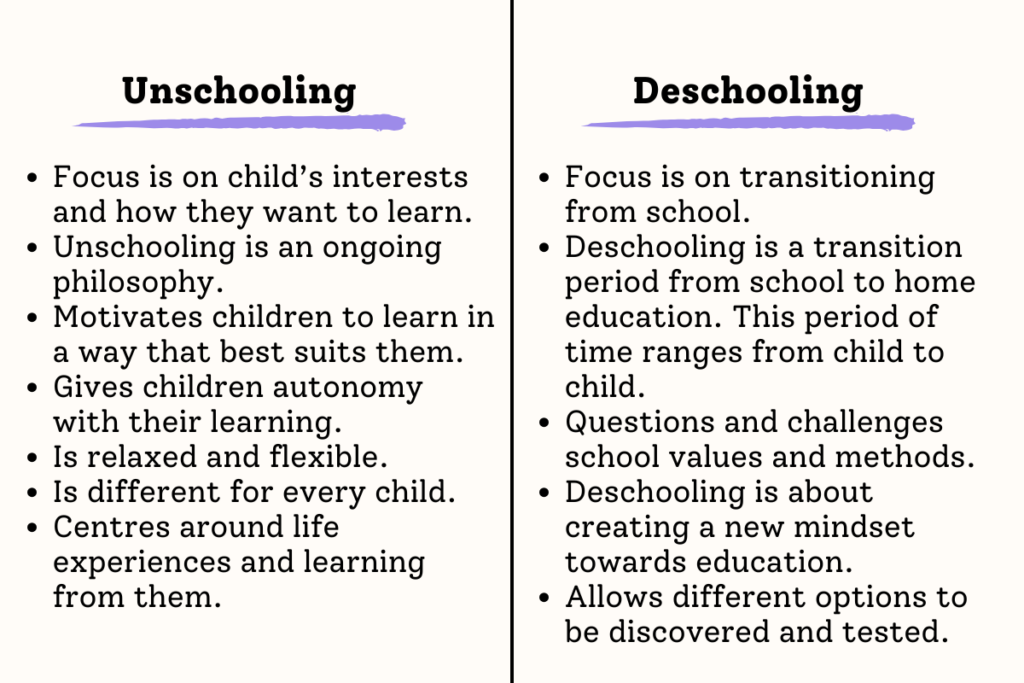
Here are some other key differences between deschooling and unschooling.
Related:
How to Unschool After You’ve Deschooled
Learning Styles of Home Education: Finding the Right One
That’s a wrap for this deschooling post! We hope you have found this information useful and that you feel more confident about what deschooling is and how to do it!

m@liberated
Want more from Liberated to Learn?
Subscribe to stay updated about new posts, resources and giveaways!












